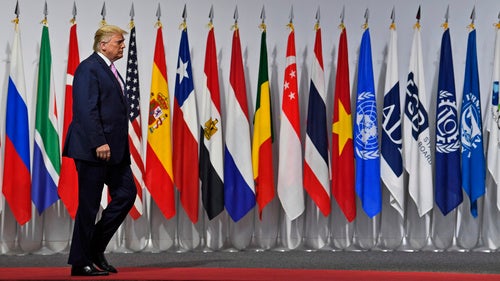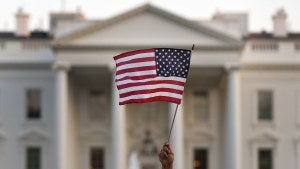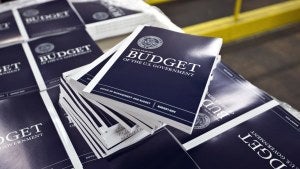Riding Shotgun: Americans Want a Break from Driving the International Order

But they’re not ready to bail out of the car just yet.
The first few months of President Donald Trump’s second term in office has been marked by major U-turns that have upended longstanding norms in the conduct of US foreign policy. Perhaps the most striking: an about-face in posture toward American partners and international commitments. The Trump administration is steering rapidly toward a world in which the United States plays a less active role in promoting its values and supporting the postwar international order.
A roundup of public opinion polls conducted January 7-February 28, 2025, finds that Americans want to keep up old alliances without paying for them. Though most voters still consider countries across Western Europe to be friendly, they are deeply divided about the fate of Ukraine. This reflects a broader disdain for foreign aid in general, though some of this boils down to an overestimate of how much the Washington spends on aid. Finally, some enthusiasm for annexing Greenland, particularly on the part of Republicans, points to a potential shift in the underlying philosophy behind how states should manage their relations with each other.
Americans Want to Scale Back Existing Commitments … and Perhaps Take Up Some New Ones
Trump’s approach to international security has commentators speculating about a new era of American isolationism. But polling shows that this narrative should be qualified by the observation that Americans still largely want to be involved in the world. The 2024 Chicago Council Survey conducted June 21-July 1, 2024, shows a majority of Americans (56%) still want to take an active part in world affairs. The question is where and how.
A CBS News poll fielded February 26-28, 2025, finds only 17 percent do not want their country to get involved in the rest of the world’s issues. Instead, two-thirds of respondents (67%) want the US to work equally alongside other allies. Just 16 percent say the US should take a leading role in the world,
In addition, most adults in America believe the US should stay in NATO (78%), while just two in 10 (22%) hope to leave the alliance.
The same poll finds that Americans still overwhelmingly consider Western allies such as the United Kingdom, France, Italy, and Germany to be allies (61%) compared to Russia (4%). Roughly equal numbers call Russia friendly but not an ally (30%), unfriendly (32%), and an enemy (34%). Somewhat consistent with this split on views toward Russia is Ukraine’s relatively lukewarm reception. Just half of Americans think the United States should provide weapons and aid to Ukraine (51%). And although explicit support for Russia stands at a miniscule 4 percent, about four in 10 Americans (44%) say they support neither Russia nor Ukraine in the war, the outcome of which is thought to be important for American interests by less than a third of respondents (31%). Ukraine and the rest of Europe may be shouting across the Atlantic for help, but much of the American public either can’t hear or won’t listen.
Republicans in particular have grown weary of supporting Ukraine. In March 2022, 80 percent of Republicans and 83 percent of Democrats backed sending additional arms and military supplies to Kyiv. However, a new Chicago Council on Global Affairs/Ipsos poll fielded March 14-16, 2025, shows just three in 10 Republicans (30%) support military aid compared to 77 percent of Democrats. Overall, only half of Americans (52%) now support additional military assistance compared to eight in 10 (79%) three years ago.
Americans Dislike Giving “Handouts,” but Vastly Overestimate the Aid Budget
Foreign aid in general has been on the White House chopping block. With the help of Elon Musk, the Trump administration made headlines by rapidly slashing $60 billion of overseas assistance and effectively dismantling the US Agency for International Development (USAID), established by John F. Kennedy.
For many, particularly Republicans, foreign aid is a ripe target for budgetary cuts. A KFF Poll fielded February 18-25, 2025, finds most US adults (58%) believe Washington spends too much money on foreign aid, and Republicans are more than twice as likely than Democrats to say so (81% vs. 29%).
The data show that some of Americans’ disdain for foreign aid may be chalked up to inaccurate information: nine in 10 (89%) overestimate the share of aid in the federal budget at least twofold. Six in 10 respondents (57%) think at least 10 percent of the budget went to aid, while 15 percent guess that the United States spent 50 percent or more on foreign aid. The real number is only around one percent. When informed of the true figure, opposition to foreign aid dropped by 31 percentage points for Republicans and by 14 percentage points for Democrats.
Democrats Far More Likely than Republicans to Oppose Arctic Expansionism
Finally, since reoccupying the Oval Office in January, President Trump has offered repeated musings on the potential annexation of Panama, Canada, and Greenland, an autonomous territory of NATO ally Denmark. Repeated surveys show Democrats are opposed to attempts to take over the Arctic island. A Yahoo News/YouGov survey fielded March 20-24, 2025, shows only 7 percent of Democrats in favor of taking over Greenland versus 38 percent of Republicans.
In a more recent CBS News/YouGov poll fielded March 27-28, 2025, about a third of US adults (33%) disapprove of Trump’s proposed annexation. A partisan breakdown, however, shows two-thirds of Republican adults (64%) would support taking control of Greenland and making it part of the US, while only one in 10 Democrats (10%) say the same.
Greenlanders, who went to the polls on March 11 amidst the geopolitical upheaval, have little desire to see their island to become an American possession. The leaders of all five parties that won parliamentary seats issued a joint statement in mid-March condemning Trump’s repeated insinuations.
On Dissatisfaction with the World Order, Actions Speak Louder than Words
Feeling fatigued with underwriting the global order, the American public wants to see allies step up. Under the new administration, the United States is now quickly taking concrete steps, sometimes drastically, to change how it participates in international politics, heralding a more fundamental shift. As support for Ukraine continues to drop, Trump has opened talks with Russia and pressured Ukrainian President Volodymyr Zelenskyy to give up the fight.
It’s unfair to say that Americans are turning isolationist, given that eight in 10 US adults hope to stay in NATO. And though a majority say they would prefer an equal role alongside their allies instead of sitting in the driver’s seat, very few are willing to hop out of the car altogether. But the new administration is substantively changing the rules of the road that have governed the international system for almost eight decades. While the swift dismantling of USAID may placate domestic grievances about spending too much outside American borders, it shows that America’s days as the “benign hegemon” may be drawing to a close.
What is the way forward? Some of the negativity toward aid stems from overestimating how much the government spends in the first place. And yet providing better information, though a good first step, will not be enough to counteract the pivot away from the established world order. Polling shows that members of the party in power want to see tangible results accrue from wielding US might. As the president shrugs off global responsibilities with both significant support from some quarters and vociferous opposition from elsewhere, politicians and policymakers should prepare for a more fractious world ahead.


Related Content
 Public Opinion
Public Opinion
While down slightly from last year, more than half support continuing military and economic assistance to Kyiv. But the results are highly partisan.
 Public Opinion
Public Opinion
While most Democrats favor taking an active part in world affairs, Republicans remain divided.
 Public Opinion
Public Opinion
The public wants to increase the budget for domestic issues like infrastructure and education but is divided over defense spending and foreign assistance.
 Public Opinion
Public Opinion
Results and analysis of the Council's annual survey of American views on foreign policy.